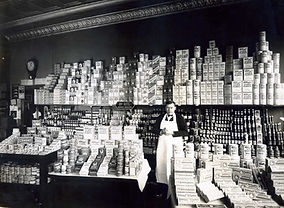
WHO WE ARE
Hohenstein’s is a trusted beer and THC beverage distributor based in Cottage Grove, Minnesota. We proudly supply retailers, bars, and restaurants across the region with an extensive portfolio of craft beers, national brands, non-alcoholic options, and THC-infused beverages. Backed by decades of industry experience, our team delivers reliable service, competitive selection, and on-time distribution that helps your business thrive. From local favorites to top national labels, Hohenstein’s is your dedicated partner in beverage distribution and growth.

HOHENSTEINS HISTORY
.jpg)
Aug. Hohenstein Groc.
Early 1900s
Hohensteins traces it's roots to a grocery store that was located on South Robert Street in...
Hohensteins traces it's roots to a grocery store that was located on South Robert Street in St. Paul, Minnesota. The store was originally started by August Hohenstein, who passed the business on to her son, Robert Hohenstein.
%20(002).jpg)
Karl's Delivery Service
Mid 1940s
After returning home from WWII, Helen's brother Karl started a delivery service...
After returning home from WWII, Helen's brother Karl started a delivery service with some of the proceeds from the sale of the grocery store.
_edited.jpg)
Hohenstein's Grocery
1943
Robert Hohenstein sold the grocery store to his daughter Helen in 1943.

Karl Hohenstein Sr.
1949-1981
Founder and President of Hohensteins. Incorperated the company March 17th, 1949.
%20(002).jpg)
The Barn - Mendota Heights
1949-1972
Hohensteins beer distribution company worked out of a barn on a property in...
Hohensteins beer distribution company worked out of a barn on a property in Medota Heights for 23 years before building their first warehouse in Woodbury, MN.

Woodbury - Radio Drive
1972
In 1972, a 12,000 square foot warehouse was built at the intersection of Radio Drive and...
In 1972, a 12,000 square foot warehouse was built at the intersection of Radio Drive and Interstate 94. It was named Radio Drive because KDWB was adjacent to this warehouse. Later, the building was added to and grew to 25,000 square feet.

Woodbury - Lake Road
1994
In 1994, the warehouse on Radio Drive was sold to be the headquarters for State Farm...
In 1994, the warehouse on Radio Drive was sold to be the headquarters for State Farm and a new warehouse was built on Lake Road in Woodbury. Originally built to be 40,000 square feet, the building was expanded in 2005 to over double it's size, measuring 88,000 Sq Ft.

Lorraine "Peg" Hohenstein
1981-1992
Became President of the company when her husband Karl passed in 1981. Peg started...
Became President of the company when her husband Karl passed in 1981. Peg started her career as a loan officer at what later became Bremer Bank.
.jpg)
Trucking Company - Eagan
1972
At the same time the delivery service/trucking company operated and grew to over 40...
At the same time the delivery service/trucking company operated and grew to over 40 trucks and trailers, until both the warehouse and the company were sold in 1972. The proceeds of this sale were used to purchase a schlitz wholesaler in Lake Elmo.







HOHENSTEINS - COTTAGE GROVE
Hohensteins quickly outgrew their Lake Road warehouse in Woodbury and in 2024 they built their biggest warehouse yet in Cottage Grove, Minnesota. Measuring 141,000 square feet with enough room on the land to expand to a wopping 320,000 square feet if needed.




HOW BEER DISTRIBUTION STARTED
In the early 1900s, the beer industry relied on “tied-houses,” where brewers controlled taverns by offering credit, equipment, and incentives in exchange for selling their brand exclusively. This system encouraged aggressive sales practices that ignored customer well-being and helped spark the push for Prohibition. When the 18th Amendment banned alcohol in 1919, the industry entered a 14-year dry spell. Prohibition ended in 1933 with the 21st Amendment, which returned alcohol regulation to the states and established the Three-Tier System. This new model eliminated tied-houses by requiring beer to be sold through independent distributors, creating a fairer, more responsible market.
THE THREE TIER SYSTEM
The three tiers (brewer, distributor, and retailer) are kept separate by laws that prevent financial ties or undue influence between them. For example, beer cannot be sold on credit, and consignment sales are prohibited.
This system was created with four key goals:
-
To prevent the aggressive marketing and sales practices that existed before Prohibition
-
To provide a reliable and efficient way for governments to collect tax revenue
-
To give states and local communities control over alcohol regulation
-
To promote moderation and responsible consumption
BREWERS & MANUFACTURERS
DISTRIBUTORS & WHOLESALERS
RETAILERS

Subscribe To Our Emails
Be the first to learn about new products and deals.



